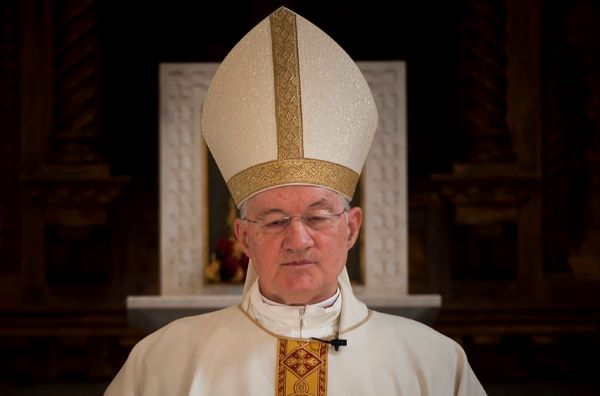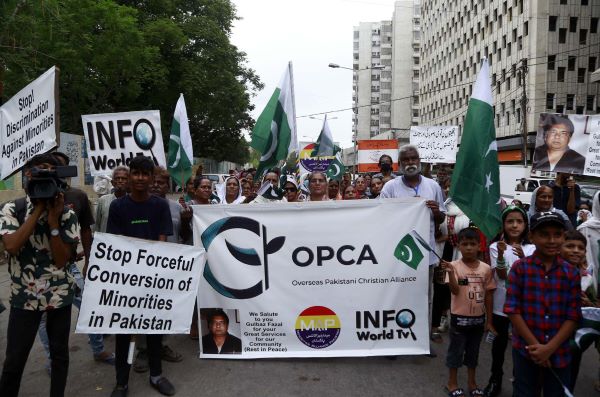Police in Hong Kong arrested ten people, including the Catholic activist Bobo Yip, under the 2020 national security law on charges connected to the 612 Humanitarian Relief Fund.
The fund helped to pay the medical and legal fees of protesters arrested during pro-democracy demonstrations in 2019. Cardinal Joseph Zen, the former Bishop of Hong Kong, was one of six defendants convicted and fined in November last year for failing to register the now-defunct fund under new terms dictated by the authorities.
Yip, a former chairwoman of the Hong Kong diocese’s Justice and Peace Commission, was suspected with the other detainees of “conspiracy to collude with a foreign country or with external elements” through the fund, according to a security department statement.
On Monday, a Hong Kong appeal court overturned the conviction of the Catholic businessman Jimmy Lai, along with six others, for organising a protest in 2019. There convictions for participating in an unlawful assembly were upheld and Lai, 75, remains in prison on other charges under the national security law.
Vietnam’s President Vo Van Thuong has met the country’s Catholic bishops to thank the Church for its work during the Covid-19 pandemic. He also reported on his recent visit to the Vatican and discussed the possibility of opening Catholic schools.
The meeting, which the bishops described as “open and sincere”, was held at the offices of the Catholic Bishops’ Conference of Vietnam in Ho Chi Minh City on 7 August.
It followed the landmark agreement signed by the president and Pope Francis on 27 July, which allows the Vatican to open an office in the country for the first time since Vietnam War ended in 1975.
Around 5,000 people – including Christians, Hindus, Sikhs and Muslims – marched through Karachi, the largest city in Pakistan, on 11 August with placards demanding equal rights for religious minorities.
They shouted slogans demanding measures against discrimination and violence amid mounting complaints from Hindus and Christians that they face harassment, rape, abduction and forced conversion.
marchers also demanded legislation and the enforcement of existing criminal laws to ensure religious freedom for religious minorities, who together form less than five per cent of Pakistan’s 230 million people.
Hindu nationalists have demanded that police in Goa arrest a Catholic priest for describing a seventeenth-century monarch as “a national hero but not a god”.
After Fr Bolmax Pereira, parish priest of St Francis Xavier Church in Chicalim, said Chatrapati Shivaji was “a hero, but not a god’”, selective quotes from his homily on social media sparked demonstrations in front of police stations accusing Fr Pereira of “hurting Hindu sentiments”.
A criminal case was filed against him, but the priest successfully applied for bail before being arrested.
Parishes in the Syro-Malabar Archeparchy of Ernakulam-Angamaly have refused to read out a letter from the papal delegate Archbishop Cyril Vasil, who was sent to the Indian see to resolve its bitter liturgical dispute.
In a letter to parishioners on 5 August, Archbishop Vasil said he was present “with the purpose of helping the archeparchy implement the Syro-Malabar synodal decision on the uniform mode of celebration of the Holy Qurbana”.
The reformed “uniform mode” of the Syro-Malabar rite has been a point of fierce, sometimes violent contention since 2021. The letter, alongside a meeting with several priests of the archeparchy, established that he would not mediate on the liturgical reforms, leading a number of parishes and lay groups to dismiss instructions to read out his letter.
The Regional Episcopal Conference of West Africa (RECOWA) has warned against using military force to restore Niger’s deposed government.
In a letter to the Economic Community of West African States (ECOWAS) on 7 August, the bishops urged the region’s leaders to learn from “uncertainties” raised by western intervention in Libya in 2011.
The letter, signed by RECOWA president Bishop Alexis Touably Youlo of Agboville, in Cote d'Ivoire, was a response to the military coup that deposed the democratically-elected government of President Mohammed Bazoum on 26 July. ECOWAS has declared its resolve to deploy all means necessary, including force, to end the coup.
Last Monday, Niger’s military junta announced plans to prosecute President Bazoum for high treason and undermining national security.
The president of Israel has visited a Carmelite monastery in Haifa recently targeted by Jewish extremists.
After failing to storm the Stella Maris monastery on Mount Carmel, the group disrupted Christians praying in its outer courtyard. Some ultra-Orthodox groups claim that the nineteenth-century monastery houses the tomb of the Prophet Elisha.
Following his visit, President Isaac Herzog said he had come “on behalf of the entire state and people of Israel to reinforce our commitment to the full protection of freedom of religion and worship”. He described recent attacks on Christians in the Holy Land as “unacceptable”, saying that “this phenomenon needs to be uprooted”.
Catholic Charities Hawai'i responded to the disastrous fires which swept the island of Maui, with the recorded death toll approaching 100 on Monday and expected to rise.
Almost all of the 13,000 buildings in the town of Lahaina, including houses, schools and churches, were destroyed by the fast-moving fires, although they seemed to have spared Maria Lanakila Catholic Church. Mgr Terence Watanabe, vicar forane for the island, said: “For us, it’s like a miracle.”
Robert Van Tassell, president of Catholic Charities Hawaii, said the effects across the islands had been “very dramatic” and appealed for donations. Barak Obama, who was born in Hawaii, published a video appeal saying that “thoughts and prayers are not enough”.
Four new auxiliary bishops appointed to the Archdiocese of Los Angeles in July include a successor to the diverse San Gabriel pastoral region, which was the responsibility of Bishop David O’Connell until his murder earlier this year.
Bishop-elect Brian Nunes, currently the vicar-general of the archdiocese, said there was “no way” he would “replace” O’Connell, but said he wanted “to continue, as best I can, his efforts constantly to make Jesus present to individuals, parishes and schools”.
The French Interior Minister Gérald Darmanin has decided to ban the far-right Catholic movement Civitas after its leader Pierre Hillard made an anti-Semitic speech at a conference in late July, saying Jews were heretics unworthy of citizenship.
“Anti-Semitism has no place in our country. I firmly condemn these ignominious comments,” said Darmanin, announcing he would start the legal proceedings to ban the party.
The ultra-traditionalist group was founded in 1999 to “restore the social royalty of Our Lord Jesus Christ”. It today claims about 1,000 members andstages headline-grabbing protests, qualifying as a political party in 2016.
Hillard told the July meeting that the naturalisation of Jews in 1791 opened the door to immigration, saying that before the French Revolution “a Jew, a Muslim, a Buddhist could not become French. Why? Because they were heretics.”
Pope Francis has changed canon law for the governance of Opus Dei and other personal prelatures in the future. A motu proprio updated two articles of the Code of Canon Law which now state that statutes governing a personal prelature can be “approved or issued by the apostolic see”.
Opus Dei, founded in Spain in 1928 by St José María Escrivá, is currently the only personal prelature in the Church. Its statutes are pending approval by the Holy See following an extraordinary general congress in April.
“Artificial Intelligence and Peace” will be the theme of World Day of Peace on 1 January 2024. The Dicastery for Promoting Integral Human Development announced the theme, which will be the focus Pope Francis’ message, on 8 August.
A dicastery statement said that “remarkable advances made in the field of artificial intelligence are having a rapidly increasing impact on human activity, personal and social life, politics and the economy”.
The Pope will address the “need to orient the concept and use of artificial intelligence in a responsible way” so that it works for “the service of humanity and the protection of our common home”. Technological development must “contribute to the promotion of justice and peace in the world”.



 Loading ...
Loading ...